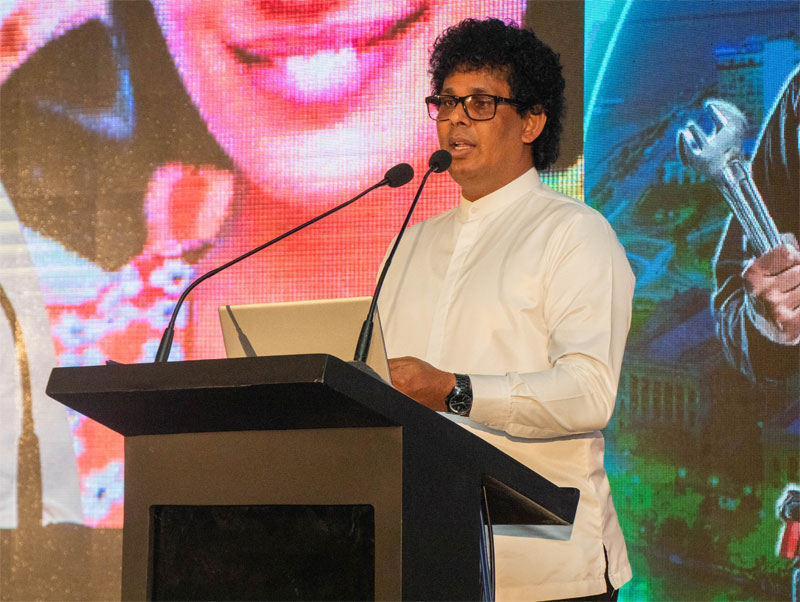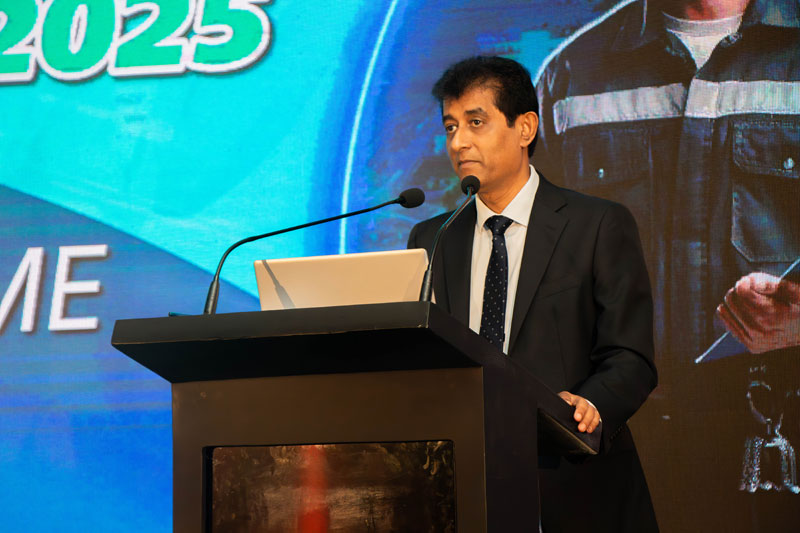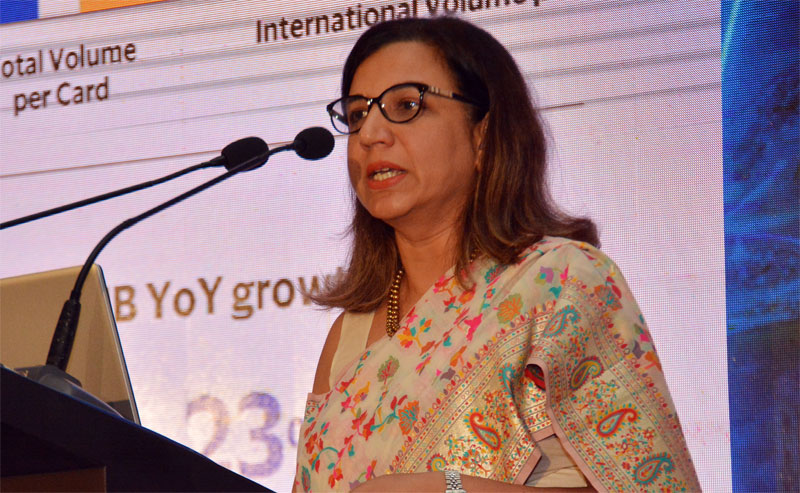
Trade, Commerce, Food Security and Cooperative Development Minister Wasantha Samarasinghe

Ceylon Chamber of Commerce Chairman Duminda Hulangamuwa

Visa Vice President and India and South Asia Commercial and Money Movement Solutions Head Shruti Gupta
- Business Matchmaking and Support Clinic, parallel to the forum, facilitates direct engagement between SMEs, buyers, banks, chambers, and trade support institutions
- Minister Wasantha Samarasinghe says MSMEs are backbone of the nation
- Outlines efforts to drive inclusive entrepreneurship and unlock SMEs’ full potential
- Ceylon Chamber Chairman Duminda Hulangamuwa says SMEs must be made national economic priority
- Visa Vice President Shruti Gupta says SMEs remain largely underserved by financial institutions
By Divya Thotawatte
In a bid to strengthen small businesses in Sri Lanka, the National SME Forum 2025, held yesterday by The Ceylon Chamber of Commerce, gathered 200+ entrepreneurs and key industry stakeholders for collaboration, capacity building, and global market access.
The full-day forum was tailored around the theme ‘Scale Up,’ with an agenda focused on empowering Sri Lankan Small and Medium-sized Enterprises (SMEs) to build and compete globally. It featured a series of expert-led discussions, interactive sessions, and tailored support clinics, bringing together policymakers, trade specialists, financial services providers, and entrepreneurs to tackle key challenges and unlock new growth opportunities.
Trade, Commerce, and Food Security Minister Wasantha Samarasinghe, attending as the Chief Guest of the event, underscored the vital position of the Micro, Small and Medium Enterprise (MSME) sector in Sri Lanka’s economy, innovation, and community development.
“These businesses contribute significantly to our GDP and employment generation. Importantly, they have adapted well even in the face of recent economic crises, continuing operations despite challenging conditions.”
Samarasinghe explained that entrepreneurs were the backbone of the nation, noting that the forum was not merely another program, but part of a broader, more significant effort to uplift MSMEs across the country.
Outlining the Government’s efforts to drive inclusive entrepreneurship and unlock the sector’s full potential, he also mentioned recent initiatives taken, such as the National Credit Guarantee Institution (NCGI) and Local Geographical Indications (GI) Registry.
Delivering the keynote address, Visa Vice President and India and South Asia Commercial and Money Movement Solutions Head Shruti Gupta said: “SMEs make up 90% of all firms globally, contribute to 70% of global GDP, and represent $ 50 trillion in business-to-business (B2B) payments. Despite this, SMEs remain largely underserved by financial institutions for the unique requirements that they have and the risks they face.”
Gupta noted that SMEs contributed to half of Sri Lanka’s GDP and 45% of employment, but still faced a massive funding shortfall. While there were 1 million small businesses, there was a $ 350 million working capital gap today, she explained.
To help ease these burdens, Visa would be introducing solutions like business cards offering “45-50 days of credit,” helping ease immediate cash flow issues. To further support SMEs, Visa would also be rolling out different digital tools over the next 6-12 months. These include:
- Digital CFO – To provide cash flow forecasting, multi-currency support, and scenario planning.
- Feather – To help offline businesses go online.
- Caramel – To enable digital advertising with the least cost and maximum impact.
According to Gupta, Visa was also tackling the data gap in SME lending through Uplink, a platform that offered scoring capabilities to help banks underwrite loans more effectively.
“Last year, we blocked $ 40 billion of fraudulent payments, and it continues to grow exponentially. As companies are growing, so is fraud,” she said, stressing the importance of secure digital finance.
In closing, she added that Visa actively sought to partner with the Sri Lankan Government, along with the country’s financial services industry and fintechs, in their journey to digitisation.
The forum featured three sessions. The first session, themed ‘Shaping the Future of SMEs in Sri Lanka – Government Plans and Engagement with the SME Sector (Next 5 Years),’ included speakers such as the Industry and Entrepreneurship Development Ministry SME Division Additional Secretary Anoja Herath, Central Bank of Sri Lanka Assistant Governor Dr. Chandranath Amarasekara, LankaPay CEO Channa de Silva, and National Enterprise Development Authority (NEDA) Chairman Lakshman Abeysekera.
The second session was ‘Take your Business Beyond Sri Lanka – Connect Directly with Export Counsellors from India, EU, UK, and UAE, and Learn How to Plug into Global Value Chains.’ The speakers for this session included Department of Commerce Trade Promotion and Regional Affairs Head and Commerce Acting Director Nalinda Wijerathna, British High Commission Sri Lanka Trade Director and South Asia Trade Policy Adviser Mara Waters, DHL Keells Country Manager Dimithri Perera, Export Development Board (EDB) General Development Additional Director Anoma Premathilake, and DDS Global Connect and International Trade Consultancy Founding Partner and Senior Trade Facilitation Expert Dinesh De Silva.
A third session, themed ‘How to Keep Up in the Age of AI – Explore How SMEs Can Leverage Artificial Intelligence to Stay Competitive, Agile and Future-Ready,’ featured speakers AI Advisory Committee Chairman Romesh Ranawana and AI Advisory Committee Member Sanjini Munaweera.
Speaking at the event, Ceylon Chamber Chairman Duminda Hulangamuwa, emphasising the importance of SMEs as a national economic priority, said: “Today marks an important milestone in our collective effort to strengthen one of the most vital segments of our economy – the SME sector.”
Highlighting the Ceylon Chamber’s three-pillar strategy of Policy Advocacy, Engagement, and Market Access, he added that the participation of SMEs from across the country strongly signalled the national scope and inclusivity of the conversation relating to scaling up Sri Lanka’s SME sector.
A Business Matchmaking and Support Clinic ran parallel to the forum, facilitating direct engagement between SMEs and buyers, banks, chambers, and trade support institutions. Industries represented included tea, spices, ICT, wellness products, food and beverages, crafts, and eco-solutions.
Pix by Upul Abayasekara








